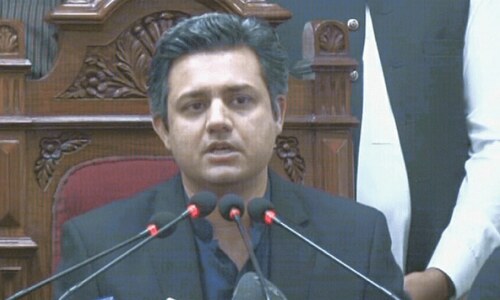ISLAMABAD: The Supreme Court – hearing two identical appeals against the March 9 Islamabad High Court (IHC) judgment accepting Mumtaz Qadri’s plea to annul provisions of the Anti Terrorism Act (ATA) 1997, from the case against him – also framed five substantial questions on Thursday, whose determination may well change the way blasphemy laws are applied in the country.
A three-judge bench, headed by Justice Asif Saeed Khosa, accepted for regular hearing two appeals; one moved by Advocate Mian Nazir Akhtar on behalf of Mumtaz Qadri – the Punjab policeman who assassinated former Punjab governor Salmaan Taseer on Jan 4, 2011 – and another filed by the federal government, also challenging the IHC verdict.
The high court had dismissed Qadri’s petition against the awarding of the death sentence under the Pakistan Penal Code (PPC), but accepted his application to void Section 7 of the ATA, that calls for the punishment of death for committing acts of terrorism.
The federal government had approached the Supreme Court to re-include terrorism charges in the case against Qadri, while he had appealed for a reduction in the sentence.
Both Mumtaz Qadri, govt granted leave to appeal IHC verdict of March 9
The case record of the trial showed that Mumtaz Qadri had admitted to killing Mr Taseer. At the time, Qadri’s counsel had argued vehemently that the murder was motivated by the fact that Mr Taseer had committing blasphemy under Section 295-C of the PPC. In this backdrop, the lawyer had argued, Qadri was justified in murdering the deceased. However, Justice Khosa, quoting from the trial record, went on to frame five questions for the court’s consideration.
Firstly, “Did any utterance by the deceased infact amount to blasphemy and whether sufficient record is available in this regard to presume the commission of such blasphemy?”
The court also noted that counsel Nazir Akhtar had cited two press clippings, including one from a Dec 23, 2010 issue of the monthly Newsline, which prima facie indicated that the blasphemy law was improperly applied in this case since the deceased did not, apparently, utter any word defiling the sacred name of the Holy Prophet (peace be upon him).
Secondly, “Does Qadri, acting in his own private capacity, enjoy the right to kill anyone without recourse to the law if he entertains an impression that the deceased had committed blasphemy?”
Article 9 of the Constitution, which ensures that no one would be deprived of his life and property, would be relevant in this case, the court observed.
Thirdly, “Even if the petitioner entertains the impression about the commission of blasphemy and even if he was motivated by religious sentiments, could he still have killed the deceased especially at a time when he was performing the duty of an official guard, in official uniform, with an official firearm supplied with official bullets.”
It would be relevant in this context to consider, the court said, whether the deceased could be deprived of his life in a broad daylight while in the protection of Qadri. Would such a killing not offend religious injunctions and traditions, the court asked.
Fourthly, “Will the confession by Qadri of killing the deceased before the trial court not attract Section 304 and 302(a), which carry the punishment of death only and no alternative sentence?”
And lastly, “If this court did not interfere in the case of the petitioner’s conviction, is there any mitigating circumstance available that warrants reduction in the sentence?” This may be relevant in the present context, when the petitioner has admitted that he had no personal enmity, but only acted on religious motivation, the court said.
“These questions require the court’s consideration, therefore Qadri’s appeal is allowed and leave to appeal is granted,” the court observed.
“Look at the implication of granting a license to kill if, in someone’s opinion, the victim had committed blasphemy,” the court observed and then went on to ask how the state should convict those who butchered people in the name of religion.
“Forty-five innocent people were butchered in Karachi on Wednesday and the pamphlet left at the crime scene says exactly what you are saying,” the court observed, pointing towards the counsel. “Is this allowed by Islam,” the court asked.
The court also granted the government leave to appeal and Islamabad Advocate General Mian Rauf, appearing on behalf of the state, pleaded that the high court had failed to adhere to Section 6 of the ATA while holding that the case did not fit the definition of terrorism when the provisions stipulated that the offence of murder for advancing religious cause amounts to terrorism and thus can be tried the anti terrorism court.
The court, however, postponed further proceedings for October with the consent of both parties and ordered the office to club the two appeals so that they could be heard together.
Published in Dawn, May 15th, 2015
On a mobile phone? Get the Dawn Mobile App: Apple Store | Google Play












































